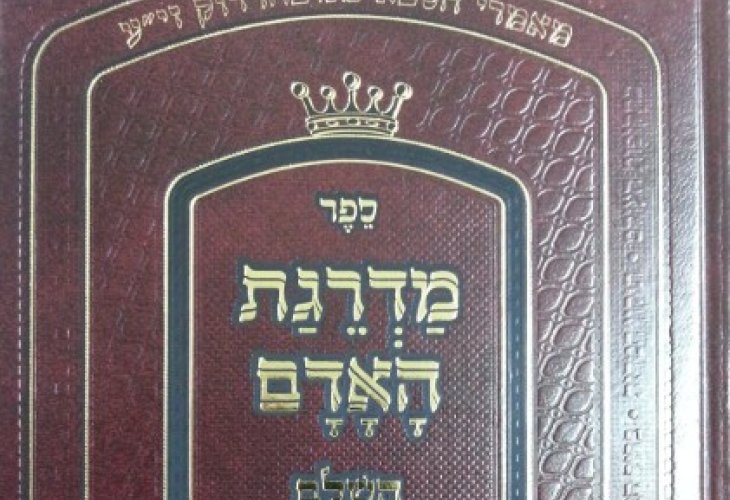Torah Personalities
The Alter of Novardok: A Revolutionary of the Jewish Soul
Marking 105 years since his passing, the legacy of Rabbi Yosef Yozel Horowitz lives on through his fearless pursuit of inner truth and spiritual discipline
 "Madregat HaAdam", the book by the Saba of Novardok
"Madregat HaAdam", the book by the Saba of NovardokThis Wednesday, the 17th of Kislev, marks 105 years since the passing of Rabbi Yosef Yozel Horowitz, known as the Alter of Novardok. A leading figure in the Mussar movement, he shaped generations of students with a radical vision of personal growth, moral clarity, and unwavering faith.
From Merchant to Mussar Master
Born in Plongian, Lithuania, Rabbi Yosef Yozel was the son of Rabbi Shlomo Zalman Horowitz, the town’s rabbi. As a young man, he demonstrated exceptional intellectual gifts. After marrying, he took responsibility not only for his own family but also for his widowed mother-in-law’s household.
While conducting business in the port city of Memel, he encountered Rabbi Yisrael Salanter, founder of the Mussar movement. That meeting changed his life. Rabbi Yosef Yozel abandoned his business career and secluded himself in his home in Slabodka for nearly two years, dedicating himself entirely to Mussar study and self-refinement.
Toward the end of this period, he sought guidance from Rabbi Simcha Zissel Ziv, the Alter of Kelm, who persuaded him that Mussar must not remain a private discipline; it needed to be spread. Accepting this mission, Rabbi Yosef Yozel began traveling from town to town throughout the Pale of Settlement, establishing batei midrash focused on Mussar alongside Gemara study.
Eventually, he founded the famed Novardok Yeshiva Beit Yosef, which became the nucleus of a network of yeshivot across Eastern Europe. He opened branches in cities such as Berdichev, Kiev, Homel, Odessa, and Mykolaiv. At its height, the network served approximately 4,000 students. All were built around the central principles of practical character development and relentless spiritual growth.
The Alter taught that transformation could occur in a single moment. Citing the halachic (Jewish legal) statement that if a man proposes marriage “on condition that I am righteous,” even if he is thoroughly wicked, the marriage is valid, because perhaps he had a thought of repentance. From this he concluded: “If the law accounts for instant change, then reality must allow for it. A person can truly emerge from darkness to light in a single moment.”
A Life of Sacrifice and Spiritual Resistance
During World War I, the Novardok Yeshiva relocated to Homel to avoid the front lines. In 1919, Rabbi Yosef Yozel moved with part of the student body to Kiev, hoping to support Jewish refugees. There, in the midst of poor sanitary conditions, many fell to illness. The Alter did everything he could to help but ultimately succumbed to the epidemic himself, passing away on the 17th of Kislev, 5680 (1919). His remains were brought to Israel nearly 50 years later and reburied on Har HaMenuchot in Jerusalem.
His character and worldview were so impactful that writer David Zaritzky authored a biographical novel about him titled Gesher Tzar (“Narrow Bridge”).
Rabbi Yosef Yozel's students included many of the greatest Torah leaders of the next generation. Among them were his sons-in-law Rabbi Avraham Yaffe and Rabbi Yisrael Yaakov Liubchansky; Rabbi Yoel Branchik of Tsaritsyn; Rabbi Avraham Zalmanis of Rostov; Rabbi David Bliakher of Mezhirich; Rabbi Aharon Weinstein of Tel Aviv; Rabbi Shabtai Nachumovich of Siedlce and Haifa; Rabbi Chaim Zaichik; Rabbi Yehoshua Lev of Luber; Rabbi Hillel Witkind, founder of Yeshivat Beit Yosef in Tel Aviv; Rabbi Yaakov Yisrael Kanievsky, who served as a rabbinic lecturer in Pinsk and later headed Beit Yosef in Bnei Brak; Rabbi Shlomo Bloch, a key figure in the Mussar movement and disciple of the Chafetz Chaim; and Rabbi Shmuel Vintropp, who led the Beit Yosef yeshiva in Pinsk.
The Teachings that Changed a Generation
Rabbi Yosef Yozel’s central ideas are collected in his seminal work, Madregat HaAdam, a two-part volume exploring the stages of spiritual growth. The book addresses topics such as: the nature of the world, refinement of character, inner truth, paths of repentance, choosing life, cultivating trust in Hashem, fear and love, the pursuit of perfection, ethical accountability, and the power of influencing others.
Even after a century, the Alter of Novardok’s voice continues to echo through the halls of Mussar yeshivot and the writings of his students. His message remains both radical and timeless: the human soul is capable of profound, immediate change and there is no limit to how far one can rise.

